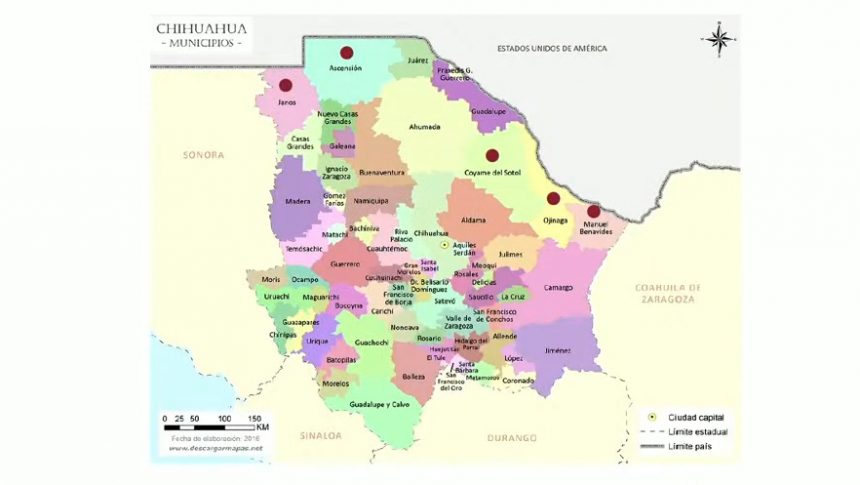Juárez will not be among the 1st Chihuahua border cities to vaccinate people 18 to 39

CIUDAD JUÁREZ, MEXICO -- México announced Tuesday morning that it will begin administering the Covid-19 vaccine to people aged 18 to 39 in Chihuahua border cities starting on Thursday, but Ciudad Juárez is not among the first ones.
Mexican border cities have been vaccinating people from that age group in hopes that the U.S. will agree to lift the border crossing restrictions by this month. The restrictions have been in effect since March of 2020 due to the pandemic.
At the request of Mexican President Andres Manuel López Obrador, the first border municipalities that will vaccinate people aged 18 to 39 will be Ascensión, Coyamel del Sotol, Janos, Manuel Benavides y Ojinaga.
Chihuahua will vaccinate people in those cities from July 8 to July 10. Vaccinations will continue right away in other parts of Chihuahua, including Juárez, if doses are available.
"We have the goal of administering 20,000 vaccines. If we finish earlier, we could be looking at availability to continue in more municipalities," Mexican Security Secretary Rosa Icela Rodríguez said during a news conference Tuesday morning. "If we have vaccines, we will immediately continue in Juárez, in Praxedis G. Guerrero and in Guadalupe."
Rodríguez said México is also waiting for hundreds of thousands more doses to continue the border vaccination efforts.
Officials didn't say when vaccinations for those aged 18 to 39 will begin in Juárez, but people have been able to register here: https://mivacuna.salud.gob.mx/index.php
Rodríguez and López Obrador didn't explain why Juárez was not included in the first group.
Juárez has more than half a million people aged 18 to 39. It's the second largest Mexican border city, only behind Tijuana.
El Paso County Judge Ricardo Samaniego has said it's important that Juárez is vaccinated. He has explained El Paso can't reach herd immunity without Juárez. That's Samaniego helped organize a vaccination event in Tornillo that began Tuesday. The goal is to vaccinate up to 50,000 Juárez maquiladora workers.
Mexico announced in early June that the U.S. donated 1.3 million Johnson & Johnson doses. President López Obrador requested to use them to vaccinate border cities.
However, those shots were first sent to the state of Baja California last month, leaving many people in Juárez and other parts of the country wondering when it would be their turn.
President López Obrador later explained that Mexico would vaccinate border states from west to east.
Baja California used 1.2 million of those donated J&J doses last month. The state of Sonora began administering the remaining 93,000 shots last week and will finish vaccinating people 18 and older on Tuesday.
López Obrador said last week that once Sonora ran out of the J&J doses, it would start to administer the Pfizer vaccine.
Mexico said Sonora had vaccinated nearly 200,000 people from that age group before the last day of vaccinations, which means the state no longer has those shots donated by the U.S.
Mexican officials have not said if Chihuahua will also use the Pfizer vaccine on people 18 and older. President López Obrador said a few weeks ago that Mexico was in the process of requesting another 1.3 million J&J doses from the U.S., but no one has said when or if that donation is actually happening.
Mexico is running out of time. Restrictions are set to expire July 21, but could be extended again if the U.S. feels that Covid-19 remains a threat.
The J&J vaccine has the advantage of being a single-dose shot. You get the most amount of immunity two weeks after being vaccinated.
The Pfizer vaccine requires two doses that are administered about a month apart. You're also considered fully immunized two weeks after the second shot.
If Mexico ends up using the Pfizer vaccine along the rest of the border, it would take longer for people to be fully vaccinated.
Secretary of Foreign Affairs Marcelo Ebrard said in early June that the U.S. could end crossing restrictions by July thanks to the border vaccination efforts.
During a news conference Tuesday morning, Ebrard said Mexico has been talking with the U.S. Department of Homeland Security and American lawmakers about the possibility of lifting crossing restrictions soon. He said the economic impact has been big and feels there isn't a good reason for the restrictions to remain in place.
"For example, Tijuana and San Diego have the same vaccination level, so what would be the reason to unnecessarily keep activity restrictions? We are awaiting an answer," Ebrard said.
Ebrard also mentioned the possibility of only reopening parts of the border where vaccination levels are high, but he once again said Mexico is talking with the U.S. to make a final decision soon.
In El Paso, more than 65% of the eligible population is fully vaccinated. In Juárez, only about 18% of the population is fully vaccinated.
